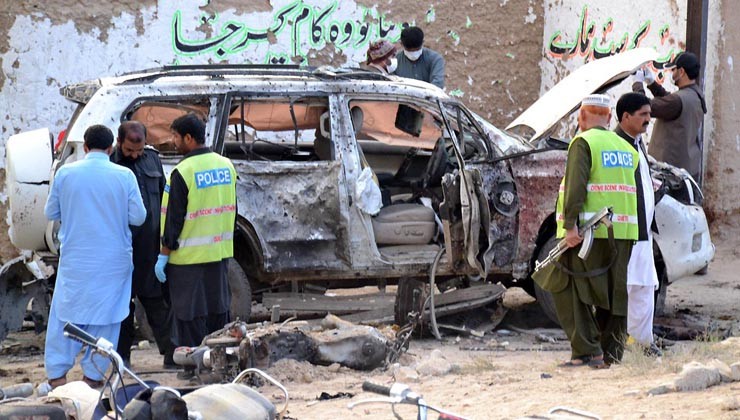
The high-sounding promises around expected windfalls from CPEC will remain elusive unless basic political issues are resolved

The attacks on the convoy of Maulana Abdul Ghafoor Haideri in Mastung and labourers in Gwadar district on May 12 and 13 respectively show that all is not well in Balochistan. These tragic incidents almost coincided with the participation of the prime minister and chief ministers in ‘Belt and Road Forum’ in Beijing.
But during the past few years, hundreds of innocent citizens have been killed in targeted ambush and bomb attacks. With a less than desirable mechanism of law enforcement in the province, there seems to be no let-up in such incidences, which only add to the discontent in the terror-struck region.
The high-sounding promises around expected windfalls from China Pakistan Economic Corridor (CPEC) will remain elusive unless basic political issues are resolved.
Ever since the controversial Balochistan army operation began in the 1970s, the Baloch polity has been feeling a sense of deprivation within the state structure of Pakistan. Scores of skirmishes, military actions, guerrilla struggle/resistance, and executions have marred the history of this turbulent province.
A sentiment that has recently developed among the political cadres is the sense of disenfranchisement. A dangerous trend in the Balochistan politics is emerging; that the rational, liberal and secular parties seem to be losing the support and sympathies of ordinary people. This can be seen in the form of criticism that the National Party and other parties receive at corner meetings and other public events.
The disgruntled Baloch and their supporters need to be brought into the mainstream for the removal of their grievances and political concerns. The provincial government, at present, is largely seen as puppet with its strings controlled from the centre. The entire provincial regime seems to be useless in terms of basic governance matters.
With the local government totally reduced to a by-stander in service delivery matters, the provincial government cannot be absolved of its responsibilities. Sufferings of the Baloch people during disasters and calamities could not be managed by the provincial government.
A sizable population has been forced to live under the sky due to forced dislocations. Law and order has worsened to such an extent that even top political figures are not safe. The assassinations of Habib Jalib Baloch of Baloch National Party in 2010, scholar and teacher Saba Dashtyari in 2011, and many leaders of political parties a few years ago are proof.
The instances of sabotage, destruction, and killings are still there despite claims of security enforcement by the establishment. In the half-hearted attempts to bring normalcy to the province, the peculiarities of social and geo-physical structure of the province were largely ignored. Despite being one of the most thinly-populated regions, Balochistan possesses a diverse range of communities inhabiting its territories in a most traditional manner.
Knowing too well the conflicting interests of tribes and their chieftains, the colonial masters skillfully maintained administrative calm for a sizable part of their rule. Trouble began showing up soon after the partition when the sociological peculiarities were ignored.
Limited participation of local interest groups in the political administration and organisation of their own context generated a sense of deprivation. This could have been addressed only through an effective and open-ended political process, which was sadly missing for most of the post-independence history.
The discovery and subsequent utilisation pattern of natural resources further fueled this frustration. Sui remained a troubled area during the 1950s when attempts to bring order failed. The situation in other parts of the region was no different.
Exploitation of common people at the hands of tribal chieftains was another unending problem. To pursue their personal objectives, the sardars established linkages with the establishment at the cost of principled stand of their people.
Ensuing political fragmentation and factional fighting hardly allowed any worthwhile political force to emerge. Inter-ethnic and sub-regional dialogue could also not evolve. Major ethnic denominations, such as Pakhtuns in the north, Baloch in the central part of province and coastal natives in the Makran strip could hardly strike a political consensus to become a unified voice.
The previous government launched Aghaz-e-Huqooq-e-Balochistan with a great deal of pomp and show. However, it has failed to act as a remedy or even a ray of hope. The past attempts of federally-sponsored programmes have generated several controversies. Projects related to expropriation of land and resources by other communities and state agencies; marginalisation of mega development projects and plans for the construction of military garrisons in Sui, Kohlu, Awaran and Gwadar are key concerns cited by some factions of the Baloch leadership.
Sections of the local population also allege that the overt and covert roles of intelligence agencies are another cause of the simmering discontent. Thousands of people have disappeared, leaving behind question marks about the veracity of official claims.
The Balochistan situation is now internationalised. One finds Baloch citizens whispering that CPEC, which is likely to initiate large-scale investment schemes in the real estate ventures and other development sectors, may not benefit the Baloch as the bulk of investors will be from outside of Balochistan.
The locals argue that schemes with an instant impact on livelihood and possibility of creating small to medium scale service enterprises shall be effective to help the Baloch population.
An all-parties conference should be called to deliberate on the core issues. This approach can later be expanded to other key players. The trust of the people and power-wielding stakeholders must be restored in the political process launched by the government. This cannot be done without taking a few bold decisions.
In order to set the initiative rolling, the regime must announce amnesty and ceasefire. Release of political detainees and locating the missing persons can be the starting point to win over the other side. The best way is to provide political space to help evolve a feeling of participation amongst all political forces. No political group can become a security threat if genuinely accommodated in the normal political process.